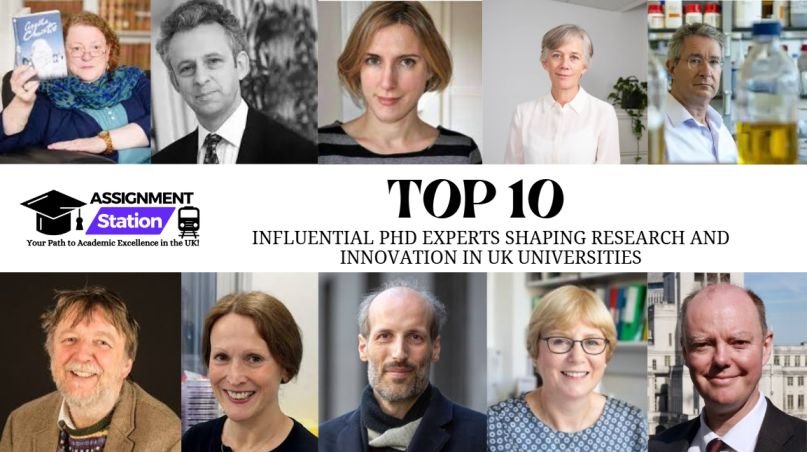Introduction
The UK is home to some of the world’s top academic institutions, known for their robust research environments and influential PhD experts. These scholars are at the forefront of their respective fields, driving innovations in everything from neuroscience and public health to mathematics and energy solutions. Their expertise not only enhances the academic landscape but also brings practical solutions to global challenges. Here, we explore ten distinguished PhD experts who are shaping research and innovation across UK universities.
10 PhD Experts at UK Universities
Sir Richard Friend – Revolutionizing Organic Electronics
Institution: University of Cambridge
Field: Condensed Matter Physics
Sir Richard Friend is widely recognized as a leader in condensed matter physics, particularly in the study of organic semiconductors. In fact, his pioneering research has not only advanced organic electronics but also led to significant breakthroughs in displays, lighting, and solar energy technologies. Additionally, through his innovative approaches, he has successfully transformed organic materials into highly efficient conductors, thereby reshaping possibilities for sustainable energy. Ultimately, Friend’s work serves as a powerful testament to how academia can drive technological progress and positively impact industries worldwide.
Professor Sarah-Jayne Blakemore – Unveiling the Adolescent Brain
Institution: University College London
Field: Developmental Neuroscience
Professor Sarah-Jayne Blakemore’s research on adolescent brain development is groundbreaking, providing insights into behavior during adolescence. Her studies explore how social and cognitive changes impact decision-making, risk-taking, and learning in young people. This research is critical for education and mental health policies, which benefit from understanding the developmental trajectories during adolescence.
Professor Angela McLean – Advancing Mathematical Biology
Institution: University of Oxford
Field: Mathematical Biology
At the University of Oxford, PhD expert Professor Angela McLean has made significant contributions to the mathematical modeling of infectious diseases. Her models are crucial in epidemiology, providing insights into disease transmission and control. During the COVID-19 pandemic, McLean’s work played a key role in shaping public health decisions. Her research exemplifies how interdisciplinary approaches, particularly the application of mathematical tools, can clarify complex biological systems.
Professor Jonathan Heeney – Pioneering Vaccine Research
Institution: University of Cambridge
Field: Virology
A leading virologist, Professor Jonathan Heeney has focused on developing innovative vaccines against emerging infectious diseases. His work in Cambridge’s Department of Veterinary Medicine addresses global health challenges through novel immunization strategies, pushing the boundaries of preventive medicine. His expertise is invaluable as the world continues to battle viral threats, and his contributions have implications for both human and veterinary health.
Professor Dame Sue Black – Leading Forensic Anthropology
Institution: Lancaster University
Field: Forensic Anthropology
Professor Dame Sue Black is renowned in forensic anthropology, where her work has advanced methods for identifying human remains. Her expertise has aided in criminal investigations globally, making forensic sciences more precise and reliable. Black’s research also has significant humanitarian applications, including the identification of disaster victims. Her achievements demonstrate how specialized knowledge can have wide-reaching impacts beyond academia.
Professor John Hardy – Transforming Alzheimer’s Research
Institution: University College London
Field: Neurodegenerative Disease Research
Professor John Hardy’s research on neurodegenerative diseases has greatly advanced our understanding of Alzheimer’s. By targeting genetic and molecular mechanisms, his work opens promising paths to treatments. Moreover, his insights into disease progression drive new therapeutic strategies, offering hope to millions worldwide affected by dementia.
Professor Wendy Barclay – Combatting Respiratory Viruses
Institution: Imperial College London
Field: Virology
As a leading expert on respiratory viruses, Professor Wendy Barclay’s research is critical in developing strategies to combat viral infections such as influenza. Her work at Imperial College London is particularly relevant in the context of pandemic preparedness and response. By investigating how viruses evolve and spread, Barclay’s studies inform public health strategies aimed at minimizing the impact of viral diseases.
Professor Martin Hairer – Breakthroughs in Stochastic Analysis
Institution: Imperial College London
Field: Mathematics
Professor Martin Hairer, a Fields Medalist, is indeed one of the most influential mathematicians of his generation. Not only have his contributions to stochastic analysis revolutionized probability theory, but they have also impacted fields as diverse as physics, finance, and climate science. Furthermore, his groundbreaking work clearly exemplifies the abstract power of mathematics in offering solutions to practical problems, thereby influencing research and innovation across a wide array of disciplines.
Professor Alison Smith – Sustainable Solutions in Bioenergy
Institution: University of Cambridge
Field: Plant Metabolism
Professor Alison Smith’s research on plant metabolism is crucial for advancing bioenergy as a sustainable fossil fuel alternative. By focusing on algae and other plant systems, her work explores efficient biofuel production, providing a renewable energy source with a lower environmental impact. Thus, Smith’s contributions make her a leader in sustainable energy, helping to address urgent environmental challenges.
Professor Chris Whitty – Guiding Public Health Policy
Institution: London School of Hygiene & Tropical Medicine
Field: Epidemiology
Among the leading PhD experts at universities in UK, Professor Chris Whitty has played an instrumental role in shaping the nation’s response to public health challenges, particularly during the COVID-19 pandemic. His expertise in infectious diseases and public health policy provides a robust framework for managing health crises in the UK. Whitty’s contributions highlight the critical importance of research-informed policies in protecting public health and preparing for future challenges.
Conclusion: Impact Beyond Academia
The work of these PhD experts not only enriches the academic community but also extends far beyond the walls of universities in uk. Their research drives innovations that shape industries, influence policy, and address some of society’s most pressing challenges. From the development of sustainable energy to advancements in public health and virology, these scholars exemplify the role of research in generating real-world impact.
In academia, platforms like Assignment Station and assignment help resources are essential for students aspiring to follow in these experts’ footsteps. By offering guidance and tools, these services help future scholars refine their research skills—crucial for impactful contributions in any field. As these experts continue to advance knowledge, they inspire the next wave of researchers to drive innovation and discovery in the UK.


